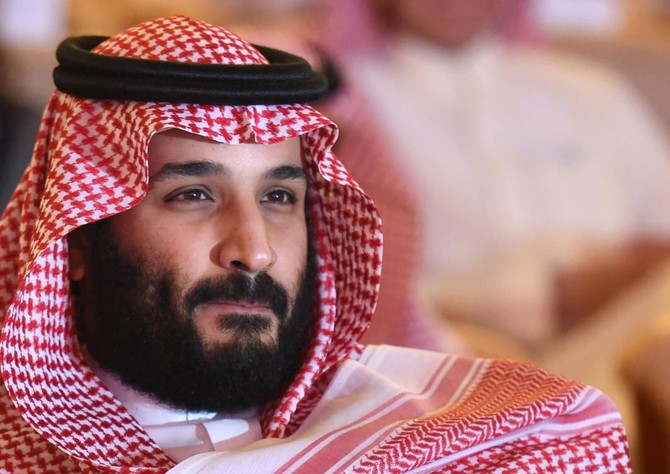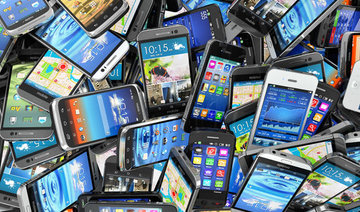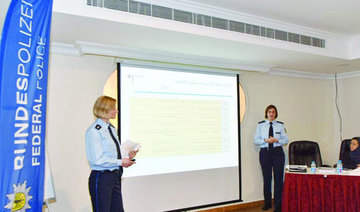JEDDAH: Saudi Crown Prince Mohammed bin Salman has dismissed claims that the anti-corruption drive in the Kingdom, which led to the arrest of several prominent royals, was a power grab, saying such comments were “ludicrous.”
He added that the public prosecutor believed the amount of funds that could eventually be recovered could amount to $100 billion.
The crown prince told the New York Times that many of those being held in the Riyadh Ritz-Carlton had pledged allegiance to him and the proposed reforms.
Adding that he also had the support of most key royals, he said: “Our country has suffered a lot from corruption from the 1980s until today. The calculation of our experts is that roughly 10 percent of all government spending was siphoned off by corruption each year, from the top levels to the bottom. Over the years the government launched more than one ‘war on corruption’ and they all failed. Why? Because they all started from the bottom up.”
He said when his father King Salman, who was clear of any corruption charges, came to power, they decided it was time to put an end to the problems tarnishing the country’s reputation.
“My father saw that there is no way we can stay in the G-20 and grow with this level of corruption. In early 2015, one of his first orders to his team was to collect all the information about corruption — at the top,” the crown prince said.
He added that the team took two years to piece together the “most accurate information,” which finally led to the production of a list of 200 names.
Each of the billionaires and princes accused of corruption was arrested, presented with the evidence and given the choice to come clean, the crown prince said.
He added that about 95 percent agreed to settle, signing over cash or shares in their businesses to the Saudi State Treasury.
The crown prince said a further 1 percent were able to prove their innocence, while the remaining 4 percent insisted they were not corrupt and wanted to go to court with their lawyers.
He said it was not possible to get rid of all corruption, but the current drive would send a signal that there is no escape.
Asked about his recent comments about moving Saudi Arabia to a more moderate and tolerant form of Islam, he said: “Do not write that we are ‘reinterpreting’ Islam — we are ‘restoring’ Islam to its origins — and our biggest tools are the Prophet’s practices and (daily life in) Saudi Arabia before 1979.”
During this time, he explained, the Kingdom had musical theaters, men and women mixing, and respect for Christians and Jews. He added that the first commercial judge in Madinah was a woman.
The crown prince praised US President Donald Trump, describing him as “the right person at the right time.”
He said Saudi Arabia is slowly building a coalition with its allies to “stand up to Iran.”
The crown prince said Iran’s Supreme Leader Ali Khamenei is the “new Hitler of the Middle East,” adding: “But we learned from Europe that appeasement doesn’t work. We don’t want the new Hitler in Iran to repeat what happened in Europe in the Middle East.”
Asked why he was implementing reforms at such a determined pace, he replied: “I fear that the day I die I am going to die without accomplishing what I have in my mind.”
He said life is too short, but he is determined to make change happen in his lifetime.
Saudi crown prince says anti-corruption drive is essential for the Kingdom’s reputation
Saudi crown prince says anti-corruption drive is essential for the Kingdom’s reputation

Saudi Arabia, UK sign pact on marine biodiversity protection

- Sea animals, mangroves to be studied, monitored regularly
- Data generated will be used to determine vital interventions
RIYADH: Saudi Arabia’s National Center for Wildlife has signed a pact with the UK’s National Oceanography Center to collaborate on marine biodiversity projects, the Saudi Press Agency reported on Thursday.
Signed in Riyadh, the collaboration between the NCW and NOC includes monitoring the health of sharks, whales, dolphins, turtles, dugongs, mangroves, seagrass, and other species.
Studies will be undertaken to determine the effects of human activities on marine ecosystems, and the use of advanced technologies to track these activities and mitigate their potential harm.

The NCW’s CEO Mohammed Qurban said the agreement would help protect wildlife, conserve ecosystems, and restore ecological balance.
The NOC’s Deputy Director Alex Rogers welcomed the partnership. “Global collaboration is essential to achieve NOC’s vision of gaining a deeper knowledge of the ocean to help every living thing on our planet flourish.”
“The seas around Saudi Arabia host a wealth of biodiversity, from rich tropical coral reefs and seagrass beds to deep-sea ecosystems that have barely been explored.
“The collaboration between NCW and NOC will generate critical data on the distribution of species and their ecosystem functioning,” Rogers told Oceanographic magazine.
Britain’s NOC is a research and technology institution specializing in marine science, with facilities in Southampton and Liverpool. It is the UK’s largest organization dedicated to sea-level science and the research and development of coastal and deep-sea technologies.
Saudi Arabia’s NCW, established in 2019 in place of the National Wildlife Authority, is tasked with “preserving wildlife and biodiversity and protecting ecosystems.”
The NWC also “prioritizes research and innovation in wildlife conservation, drawing on national and international expertise.”
Saudi students win 4 awards at European Girls' Mathematical Olympiad

- Prizes include silver, bronze, 2 honorable mentions
- 217 female students from 56 countries participated
PRISTINA: Saudi Arabia’s math team won four awards in the recently concluded 2025 European Girls’ Mathematical Olympiad.
The EGMO competition in Pristina, Kosovo, from April 11 to 17, featured 217 female students from 56 countries.
All four Saudi contestants won awards, with Fatimah Buali capturing a silver medal and Sarah Aljughayman winning a bronze.
Retaj Alsaleh and Albatool Alaidarous both garnered an honorable mention, according to the EGMO site.

The Kingdom’s tally in the annual competition now stands at 36 awards, two gold medals, seven silver, 15 bronze, and 12 certificates of appreciation.
The Kingdom was represented by the King Abdulaziz and His Companions Foundation for Giftedness and Creativity, which prepares Saudi Arabia children for international scientific competitions and Olympiads.
Saudi Arabia is among the non-European countries that have regularly participated in the annual EGMO event, which started in 2012.
The other regular participants are Japan, China, Australia, Brazil and the US.
Saudi AI researcher designs system to help people understand sign language

- ‘Using my background in computer engineering and the power of AI, I realized we could create a smart system that recognizes sign language in real time and translates it,’ says Bader Alsharif
- Though his initial version translates signs into English, he says it can be adapted to all languages and his next goal is to create a version for Saudi Sign Language
CHICAGO: Working as a teacher with members of the deaf and hard-of-hearing community helped a Saudi artificial intelligence scholar realize that technology held the potential to help improve the way they communicate with the world.
After working with people with hearing impairments for more than a decade-and-a-half, Bader Alsharif said he has come to understand that one of the greatest challenges they face is the public’s lack of understanding of sign language. He realized that if this barrier could be overcome, it would not only improve this community’s ability to communicate but also help the wider public better understand the lives of those who rely on signing.
“I decided to focus on sign language and AI because of my close work with students over the past 16 years,” the 39-year-old told Arab News. “I saw the challenges they face when it comes to communication, especially in situations where people around them don’t understand sign language.
“That really touched me and made me want to help. So, using my background in computer engineering and the power of artificial intelligence, I realized we could create a smart system that recognizes sign language in real time and translates it into words.
“This can help bridge the gap between the deaf and hearing community. In simple terms, a camera captures the person making a hand gesture and then AI models analyze those gestures using deep learning and hand tracking. Then the system matches the gesture to letters and words, and displays the meaning of the particular words.”
As Alsharif became more immersed in his academic research, he quickly identified the potential for AI to be a transformative tool in support of deaf students. He personally understands about 30 percent of sign language gestures but the AI-powered program he is developing is designed to interpret the full range of signs, which would help to bridge the communication gap.
The computer engineering scholar has spent several months working with a team to build a dataset that includes every aspect of each sign language gesture and its English translation. The dataset contains nearly 130,000 images of hand gestures, each of which is assigned 21 data points to help the system correctly identify and translate the sign.
Though the initial version is for English translation, Alsharif said datasets can be created for all languages, and his next goal is to create a version that interprets Saudi Sign Language.
“As soon as we have a good dataset, we can implement any sign language translation system into any language,” he added.
Right now, the system is one-way, translating sign language into English, with some limitations. The next challenge, he said, is to reverse the process and expand the system to translate speech, in any language, into sign language.
Originally from Makkah, Alsharif graduated with bachelor’s degree from the College of Technology in Riyadh in 2008 and began working for the Technical and Vocational Training Corporation in Riyadh. In 2017 he received a master’s degree in computer engineering from the Florida Institute of Technology.
His work aims to combine technological innovation with social impact, a goal that positions him as a forward-thinking leader in the use of computer engineering in healthcare.
Alsharif has been studying for a doctorate since 2021 at Florida Atlantic University, where his research focuses on various aspects of sign language-recognition systems, and the use of AI and the internet in the provision of medical services.
He also works as a teaching assistant, guiding and evaluating more than 30 students who are carrying out engineering-design projects. He also assists more than 200 students with advice about technical questions, design principles and project development.
“All these studies use artificial intelligence to help solve real-world problems and support people who have special needs,” Alsharif said.
Alsharif, who lives in Boca Raton, Florida, with his wife and four children, said he is grateful to the government of Saudi Arabia, which made all of his achievements possible. Other innovative projects he has led or been involved with include the opening of digital communications technology company CISCO’s first office in Saudi Arabia, and he has has managed the optimization of performance and security for more than 300 devices.
He has also published more than 10 peer-reviewed papers, with a focus on AI, cybersecurity and the Internet of Things, particularly as they relate to healthcare. He says he has a particular commitment to advancing technology and fostering inclusivity, particularly through his work with individuals with special needs.
How AI is decoding multi-omics data to boost health and longevity in Saudi Arabia

- The Kingdom is investing heavily in AI, genomics, and biotech to build a future where healthcare is predictive — not just reactive
- Saudi firm Rewind is leading the country’s shift to AI-powered omics diagnostics, transforming how diseases are prevented
RIYADH: Saudi Arabia is embracing the future of healthcare by integrating artificial intelligence and omics-based diagnostics to deliver personalized, preventive care. This is part of a broader transformation that frames longevity not just as an individual aspiration but a national priority.
Central to this transformation is the integration of genomics, proteomics, metabolomics, and other omics disciplines into clinical practice — powered by AI. Leading the charge is Rewind, a Saudi Arabia-based company using the technology to pioneer proactive, individualized care.

“At Rewind, we harness the power of AI and omics technologies to shift healthcare from a generalized, reactive model to one that is deeply personalized and proactive,” Dr. Walid Zaher, the founder of Rewind, told Arab News.
“AI is the engine that makes this vast data actionable. It identifies patterns, predicts health risks, and recommends the most effective interventions for each individual.”
He said that “such a dynamic, data-driven approach” enables healthcare to be “as unique as the patient it serves.”
DID YOU KNOW?
• Integrating AI with omics-based diagnostics supports early disease detection and predicts health risks.
• In cancer care, AI and genomics are used together to match patients with the most effective targeted therapies.
• Saudi Arabia, the US, and the UK are making major investments in the integration of AI and omics.
Omics refers to a group of biological fields ending with the suffix “-omics,” each examining a different layer of biological data on a system-wide scale. Together, they offer a comprehensive view of how the body functions.
Transitioning from this broad understanding to actionable insights requires AI’s ability to analyze trillions of variables across DNA, protein expression, metabolic changes, and epigenetic shifts. This capability allows practitioners to intervene earlier and more accurately than ever.

“Omics-based diagnostics have already begun to make a profound impact on patient outcomes,” said Zaher.
“The precision enabled by genomics and multi-omics technologies allows us to detect diseases at their earliest molecular stages — often well before any clinical symptoms appear.
“Beyond disease detection, multi-omics approaches help in monitoring disease progression and response to treatments. The result has been an increase in patient satisfaction, as they experience better health outcomes and more personalized care.”
Saudi Arabia’s commitment to health innovation is evident in both its infrastructure and ambition. National initiatives like the Saudi Genome Program and investments through the Hevolution Foundation are driving the development of a knowledge-based healthcare system aligned with Vision 2030.
“Saudi Arabia’s Vision 2030 has made healthcare innovation a strategic priority,” said Zaher. “The government has invested heavily in infrastructure that supports cutting-edge research, particularly in AI, genomics, and biotechnology.”
This focus is positioning Saudi Arabia as a major player in the global longevity economy, according to Dmitry Kaminskiy, a co-founder and managing partner of Deep Knowledge Group.

“Saudi Arabia and its GCC counterparts are strategically positioned to be not just participants but global pioneers in the longevity economy,” Kaminskiy told Arab News.
“With Vision 2030, the Kingdom has set the foundation for integrating economic diversification, healthcare innovation, and AI governance — all key components of a national longevity strategy.”
Kaminskiy, who has authored multiple books on AI and healthspan, believes that AI has shifted from a supporting role to something far more central to the field.
“We are now witnessing a paradigm shift where AI is not just an assistant but the architect of next-generation healthcare platforms,” he said. “Just as fintech redefined personal finance, AI will redefine personal health.”
Despite these advancements, significant challenges remain in mainstreaming AI and omics-based care into national systems. Zaher of Rewind noted that overcoming these hurdles will require both technological and cultural shifts.
“Integrating AI and precision medicine into a national healthcare system comes with several challenges, the most pressing of which is the need for a robust data infrastructure,” he said.
“Healthcare data is often fragmented or siloed, making it difficult to create a cohesive system that AI can utilize effectively.”
Another critical challenge is training healthcare providers to engage with this new era of medicine.
Zaher said the integration of AI and precision medicine into clinical practice demands “a level of technological literacy that has yet to become widespread across the healthcare workforce.
“We need targeted training programs that equip providers with the skills to interpret AI-generated insights and translate them into actionable, patient-centered care,” he added.
Looking ahead, Kaminskiy said establishing ethical data governance will be vital to ensuring progress.
“Data is the lifeblood of AI-powered longevity,” he said. “But it is not just the amount of data that matters — it is the ownership, security, and ethical governance of that data that will define the winners in this domain.”
The Hevolution Foundation is playing a key role in funding and shaping the longevity research agenda in the region.

According to Zaher, it is “poised to play a pivotal role in accelerating global healthspan science by providing the funding and resources necessary to drive innovation in aging research.
“Through supporting projects that focus on extending healthspan and preventing age-related diseases, Hevolution is helping to set a global standard for longevity science,” he added.
As Saudi Arabia expands its investment in AI-driven healthcare and global collaborations deepen, the boundaries between technology, biology, and medicine are blurring — bringing the goal of healthy aging closer to reality.

Islamic banking forum inaugurated in Madinah

Prince Salman bin Sultan bin Abdulaziz, governor of Madinah, inaugurated on Wednesday the 45th AlBaraka Islamic Economics Symposium, themed “Islamic Banking in 50 Years: Past Achievements and Future Aspirations,” at Prince Muqrin bin Abdulaziz University in Madinah.
The two-day symposium convened leading experts in economics, finance, and investment.
During his address at the event, Sheikh Saad Al-Shathri, Royal Court adviser and Council of Senior Scholars member, emphasized Saudi Arabia’s commitment to Islamic banking, noting that over 85 percent of the Kingdom’s banking operations adhere to Islamic principles, a globally unmatched percentage.






















